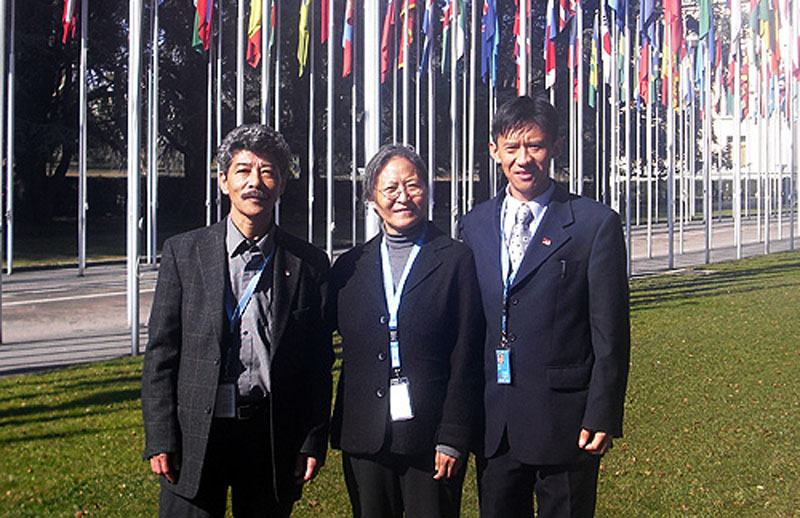 Geneva- The United Nations Council on Human Rights, now in its third week of sessions, heard from the Tibetan delegation yesterday on the issues of torture, religious freedom, disappearances and forced resettlement of nomads in Tibet. Mr. Tenzin Samphel Kayta, on behalf of the Society for Threatened Peoples, drew the Council's attention to the Chinese government's repeated failure to accurately account for thousands of Tibetans detained since 2008 and to end the practices of routine torture and illegal imprisonment.
Geneva- The United Nations Council on Human Rights, now in its third week of sessions, heard from the Tibetan delegation yesterday on the issues of torture, religious freedom, disappearances and forced resettlement of nomads in Tibet. Mr. Tenzin Samphel Kayta, on behalf of the Society for Threatened Peoples, drew the Council's attention to the Chinese government's repeated failure to accurately account for thousands of Tibetans detained since 2008 and to end the practices of routine torture and illegal imprisonment.
Mr. Kayta also reported that since the uprising and crackdown of March 2008, 228 Tibetans have died, 1,294 have been injured, 4,657 arbitrarily detained, 371 sentenced and 990 disappeared, according to Tibetan sources. Four Tibetans were executed in Lhasa on 20 October 2009 (though China confirmed only two) and 11 Tibetans were sentenced to life imprisonment. In the majority of these cases the defendants either had no independent legal counsel or authorities blocked representation through intimidation or manipulated procedures.
Mr. Kayta also addressed violations of religious freedom in Tibet, citing His Holiness the Dalai Lama's account of a Chinese 'patriotic re-education campaign' underway in many monasteries in Tibet. Under this campaign, monks and nuns are put in 'prison-like conditions, depriving them the opportunity to study and practice in peace.' According to His Holiness, these conditions are intended to 'annihilate Buddhism.'
He also cited a Chinese official's report on 4 March that the police raided a total of 4,115 rented accommodations ...more than 70 guest houses, internet cafes, entertainment Centers and bars detaining a total of 435 people.
Mr. Kayta urged the Chinese authorities to fully implement the recommendations of the Special Rapporteur on Torture and also of the Committee on Elimination of All Forms of Racial Discrimination by providing a credible clarification on the use of torture against Tibetan detainees who today number in the thousands. He also urged the Chinese authority to fulfill its pledge by receiving the UN High Commissioner for Human Rights to conduct an independent mission to all affected Tibetan areas and Xinjiang.
The following day, Mrs. Tsering Jampa on behalf of Helsinki Foundation for Human Rights, reported on 28 unresolved disappearance cases with China including Gedhun Choekyi Nyima, XIth Panchen Lama of Tibet who disappeared at the age of 6 in May 1995. She said China has failed to support its claim that Gedhun Choekyi Nyima and his family are fine but simply wish not be disturbed by outsiders. China also prohibited an independent expert from the UN Committee of Rights of the Child from visiting the Panchen Lama to confirm his well-being.
Mrs. Jampa also reported on China's resettlement policy, which forcibly relocates thousands of Tibetan nomads from their ancestral lands without consent of the Tibetan people, threatening an ancient and cherished way of life. She urged the Chinese government to immediately impose a moratorium on all resettlement programmes until independent experts carry out a review of the policies.
Following Mrs. Jampa's comments, the Chinese delegation in the plenary session reported that Tibet witnessed a 12.3% growth in GDP and that the Chinese government had respected the rights of ethnic minorities. The delegation also announced that China would receive a Special Rapporteur on the Right to Food for an official mission which could include visits to Tibet, Xinjiang and Inner Mongolia. The Tibetan delegation welcomed this announcement though the Helsinki Foundation for Human Rights remarked that Special Rapporteurs have been promised and refused by China before.
Despite the limited time slot officially allocated for NGOs, the Tibetan delegates were able to raise some of the key human rights issues of concern at this session.


![Tibet has a rich history as a sovereign nation until the 1950s when it was invaded by China. [Photo: File]](/images/stories/Pics-2024/March/Tibet-Nation-1940s.jpg#joomlaImage://local-images/stories/Pics-2024/March/Tibet-Nation-1940s.jpg?width=1489&height=878)















